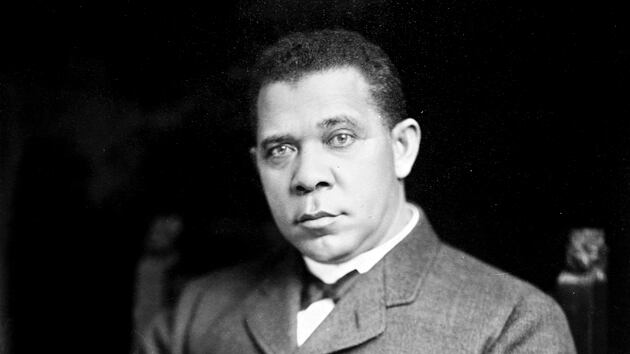Up From Slavery, the autobiography by Booker T. Washington, is a book one sees so often quoted in other histories that it's easy to develop the illusion that you have actually read it. But I hadn't, not until this past January. With Black History Month looming, I decided to rectify the lapse. Up From Slavery is a comparatively short book, and it took only a few long runs to listen to it all the way through.
The overwhelming impression through the pages of that book is one of studied artificiality. Up From Slavery was published in 1901. The decade of the 1890s had been the worst decade in American history for lynchings of black people, according to statistics compiled by Washington's own Tuskegee Institute. The voting rights of black people had been brutally curtailed across the South. The 1890s were the decade in which Jim Crow had been formalized; in the 1896 case of Plessy v. Ferguson, the Supreme Court rejected a constitutional challenge to the segregation of public conveyances and inscribed the phrase "separate but equal" into American law. The very year that Up From Slavery was published, Washington's own state of Alabama adopted a constitution that would effectively terminate black political rights for the next six and a half decades.
Yet in his memoirs, published while all these things were happening, an obviously sensitive and astute man could write again and again of how "pleasant" race relations had become in the South and of how the controversies of the unspecified past had been left behind. Could he really mean it? His story seemed at utter defiance of reality - and yet at the same time, this pioneering educator stressed again and again the importance of realism and of taking people and things as they are.
An enigmatic man, you might say - and not only might you say it, but one of the greatest of black American poets did say it, in an 1896 poem that more than one person has suggested was inspired by the life and career of Booker T. Washington:
WE wear the mask that grins and lies,It hides our cheeks and shades our eyes,—This debt we pay to human guile;With torn and bleeding hearts we smile,And mouth with myriad subtleties.
How to lift the mask from Booker T. Washington? In biography and fiction, many writers have tried, from W.E.B. DuBois onward. Their verdict was overwhelmingly hostile. In life, Booker T. Washington had gained more admiration from black Americans than any other contemporary. In memory, he was reviled as a servile race traitor, a cringing sycophant to white wealth and power. DuBois - at one point a Washington protege - offered a lengthy negative assessment Washington in "The Souls of Black Folk," published in 1903. Washington, according to DuBois
put enthusiasm, unlimited energy, and perfect faith into this program me [defined elsewhere as "industrial education, conciliation of the South, and submission and silence as to civil and political rights"], and changed it from a by-path into a veritable Way of Life. …
It startled the nation to hear a Negro advocating such a programme after many decades of bitter complaint; it startled and won the applause of the South, it interested and won the admiration of the North; and after a confused murmur of protest, it silenced if it did not convert the Negroes themselves.
A black poet from a later generation, Dudley Randall, summarized the harsh posthumous assessment in a stinging satire published in 1952:
"It seems to me," said Booker T.,"It shows a mighty lot of cheekTo study chemistry and GreekWhen Mister Charlie needs a handTo hoe the cotton on his land,And when Miss Ann looks for a cook,Why stick your nose inside a book?"
"I don't agree," said W.E.B."If I should have the drive to seekKnowledge of chemistry or Greek,I'll do it. Charles and Miss can lookAnother place for hand or cook,Some men rejoice in skill of hand,And some in cultivating land,But there are others who maintainThe right to cultivate the brain."
"It seems to me," said Booker T.,"That all you folks have missed the boatWho shout about the right to vote,And spend vain days and sleepless nightsIn uproar over civil rights.Just keep your mouths shut, do not grouse,But work, and save, and buy a house."
"I don't agree," said W.E.B."For what can property availIf dignity and justice fail?Unless you help to make the laws,They'll steal your house with trumped-up clause.A rope's as tight, a fire as hot,No matter how much cash you've got.Speak soft, and try your little plan,But as for me, I'll be a man."
"It seems to me," said Booker T.--
"I don't agree,"Said W.E.B.
But no assessment of a great man is ever quite final. Four years ago, there appeared yet another Booker T. Washington biography, under a title adapted from Washington's memoir. Up from History offers an audacious revision of Washington's reputation. To add to the audacity, the revision comes from a white scholar, Robert Jefferson Norrell. Norrell is a native of Alabama. Central to his understanding of Washington is his understanding of the place and times in which Washington lived: a place and time in which leading Americans - governors and senators - talked as casually of outright genocide against black Americans as we today would talk about balancing budgets and reforming entitlements.






